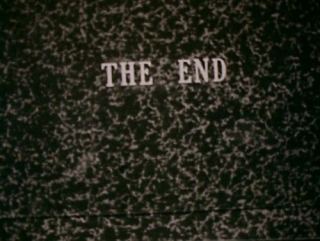Date: 30 September 2003 | Season: Christopher Maclaine
THE FILMS OF CHRISTOPHER MACLAINE
Tuesday 30 September 2003, at 7pm
London The Other Cinema
Jazz, dope and rebellion – four films from the hipster subculture of San Francisco, all made by obscure and elusive poet Christopher Maclaine. His masterpiece The End (1953), salvaged in the 60s by Stan Brakhage and revered by many since, is a remarkably apocalyptic post-war saga of impending doom: the last day on earth for six of ‘our friends’ living in the shadow of the A-bomb. These new prints of Maclaine’s complete films also feature alchemical incantation (The Man Who Invented Gold), existential despondence (Beat) and highland flings (Scotch Hop).
Christopher Maclaine, The End, 1953, colour, sound, 35 min
Christopher Maclaine, Beat, 1958, colour, sound, 6 min
Christopher Maclaine, The Man Who Invented Gold, 1957, colour, sound, 14 min
Christopher Maclaine, Scotch Hop, 1959, colour, sound, 6 min
PROGRAMME NOTES
THE FILMS OF CHRISTOPHER MACLAINE
Tuesday 30 September 2003, at 7pm
London The Other Cinema
THE END
Christopher Maclaine, 1953, b/w & colour, sound, 35m
Narrated by Christopher Maclaine. Photographed by Jordan Belson.
The End is a remarkable apocalyptic post-war saga of impending doom, which follows the last day on earth for six of ‘our friends’ living in the shadow of the A-bomb. Composed of six discreet episodes, the film builds an atmosphere of doom, infused with what seems now to be dark, ironic humour. Maclaine’s virtuoso, past-tense narration is a bewildering and incoherent rant against the impending holocaust, directly addressing the viewer, who is forced to become and active participant in the story. His fractured montage works against narrative logic, a self-destructive trait that mirrors the ‘grand suicide of the human race’.
The End is partly acted, with additional observational footage. These fleeting glimpses of the world around show normal lives continuing oblivious to the nuclear threat. Disjointed cutting, subverted narratives and cryptic camerawork fuse banality with purpose. This is a truly poetic use of cinema in the way it is able to transmit unspoken thoughts through an apparently random successions of images.
Dating from 1953, this may in fact be the first genuine ‘beat’ film, profoundly inventive and advanced for its time. Maclaine’s outlook is bleak and his techniques are crude, creating a film which is deliciously inept, but glorious. One of cinema’s starkest evocations of the Cold War period and its effect on creative thought, situated in the beat milieu of 1950s San Francisco but speaking in direct terms to generations of lost souls.
BEAT
Christopher Maclaine, 1958, colour, sound, 6m
A visual notebook which captures the existential angst and futility of bohemian life, evoking the despondent mood of a particular moment in American culture. The film is an abstract hide-and-seek featuring a man and woman wandering separately through the parks and streets of 1950s San Francisco. Perhaps they are escaping from their impoverished lives in search of freedom and enlightenment. She performs an invocation at an intersection and is later liberated, while he, less wilful, ends up losing his marbles at the beach.
THE MAN WHO INVENTED GOLD
Christopher Maclaine, 1957, b/w & colour, sound, 14m
Narrated by Christopher Maclaine. Photographed by Jordan Belson. Music by Christopher Maclaine and George Abend. Recorded by R.W. Emerson.
A demented fable of alchemical inquisition. Ridiculed by his neighbours, a madman works in isolation on a chemical formula for making gold. He finally succeeds after being told the secret in a dream, but his conceit drives him to get back at his sceptical friends, turning one neighbour into gold before he is punished by being turned to gold himself. Maclaine takes the central role, though many others (including filmmaker Larry Jordan) act as stand-ins throughout. The substitution of people is one of the metaphors representing the transformations in the story. The images are a complex mix of not only positive and negative black-and-white and colour stock, but also live action with abstract, scratched and hand-painted sections, while Maclaine’s rambling narration is an allegorical nonsense poem.
SCOTCH HOP
Christopher Maclaine, 1959, colour, sound, 6m
In acknowledgement of his Scottish heritage, Maclaine photographed this cine-poem to document an authentic highland gathering in the town of Petaluma, California. The pastimes include speed walking, tossing the caber, traditional dances, bagpipe and drum troops. Using unlikely camera angles and tight, rhythmic cutting, Maclaine performs an impromptu dance with the camera, cut to the tuneful droning of the pipes and drums. You can take the Maclaines out of Scotland, but you can’t take Scotland from the Maclaines.
All texts by Mark Webber, 2003
Back to top
